17%: aware of the District Council elections
84%: Critical consideration: stand on livelihood issues
11%: Critical consideration: political alignment
41%: Main factor: past performance
31%: Main factor: platform
77%: Prefer voting for an individual candidate
14%: Prefer voting for a political party
29%: Inclined to support the democrats
9%: Inclinded to support the pro-China camp
60%: Considered themselves to be moderate or non-partisan
75%: Proportion of voters who planned to vote in District Council election
54%: First problem to be tackled: livelihood
25%: First problem to be tackled: local district problems
6%: First problem to be tackled: economy
4%: First problem to be tackled: employment/labour

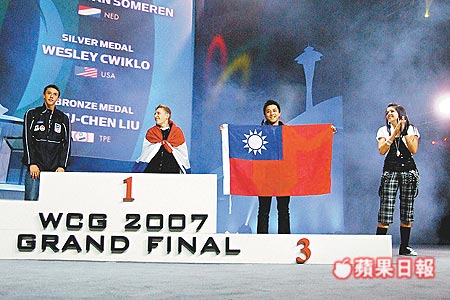
[in translation]
A few days ago, I saw the most awesome television ad ever on Linfen TV.
Three women met in the middle of the street and the following conversation took place.
A (to B): "Didn't you get a vaginal infection?"
B: "I was cured at Hospital XX."B (to C): "Didn't you get a uterine pelvic infection?"
C: "I was cured at Hospital XX."
C (to A): "Didn't you get a chlamydial infection?
A: "I was cured at Hospital XX."A,B,C shout in unision: "We all got our sexually transmitted diseases cured at Hospital XX!"
佢咁勇,真係為佢擔心
我估佢有以下幾個下場:
A 收律師信,刪POST
B 收律師信,被告誹謗
C 「無端端」身體受傷
D 時運高,乜事都冇Translation:
He is so brave that I am really worried about him.
My guess is that there are the following outcomes:
A. He receives a letter from a lawyer, and he deletes the post
B. He receives a letter from a lawyer, and he is sued for libel
C. He suffers bodily harm 'inexplicably'
D. He gets lucky, and nothing happens to himBets so far:
- 100 on C
- 1000 on D
- 100 on C
- 100 on C
- 100 on C
- bet on ABD
...
In my judgment, options A and B are unlikely because this website is registered and hosted overseas and the post is merely repeating published information from elsewhere. For example, I cited FEER's Travellers' Tales which quoted from Martin Booth's “The Dragon Syndicates: The Global Phenomenon of the Triads” (Caroll & Graf, 2000). It would seem more logical to sue FEER and Martin Booth/Caroll&Graf than me. If option C were to happen (even if I were stupid enough to step in a pothole in the street on my own and bump my head), it would be an unmitigated PR disaster and an international cause célèbre. If option D were to happen, it would have nothing to do with luck.
P.S. To the folks at HK Golden Forum: Thanks for caring -- I am a frequent visitor to your forum because I want to know what REAL people REALLY think.
Q1. There has been five presidents in Taiwan: Chiang Kai-shek, Yen Chia-kan, Chiang Ching-kuo, Lee Teng-hui and Chen Shui-bian. Which one of these presidents made the greatest contribution to Taiwan?
9%: Chiang Kai-shek
1%: Yen Chia-kan
49%: Chiang Ching-kuo
12%: Lee Teng-hui
8%: Chen Shui-bian
2%: They all made contributions
2%: None of them made contributions
17%: No opinion
Q2. Overall, what was the contribution of former president Chiang Kai-shek to Taiwan during his lifetime?
44%: More positive than negative
9%: The positives and negatives cancel each other out
17%: More negative than positive
30%: No opinion
Q3. Overall, what was the contribution of former president Yen Chia-kan to Taiwan during his lifetime?
26%: More positive than negative
5%: The positives and negatives cancel each other out
15%: More negative than positive
64%: No opinion
Q4. Overall, what was the contribution of former president Chiang Ching-kuo to Taiwan during his lifetime?
77%: More positive than negative
7%: The positives and negatives cancel each other out
4%: More negative than positive
15%: No opinion
Q5. Overall, what was the contribution of former president Lee Teng-hui to Taiwan?
41%: More positive than negative
13%: The positives and negatives cancel each other out
23%: More negative than positive
23%: No opinion
Q6. Overall, what is the contribution of current president Chen Shui-bian to Taiwan?
18%: More positive than negative
10%: The positives and negatives cancel each other out
52%: More negative than positive
21%: No opinion
Q7. Overall, do you feel that President Chen Shui-bian has been leading the state policies in the right or wrong direction over the past several years?
25%: Right direction
53%: Wrong direction
22%: No opinion
Democratic Progressive Party supporters (21%): 71% right direction, 17% wrong direction
Kuomintang supporters (29%): 4% right direction, 86% wrong direction
People First Party (5%): 5% right direction, 86% wrong direction
Taiwan Solidarity Union (2%): 65% right direction, 30% wrong direction
Independent (43%): 16% right direction, 49% wrong direction
On the morning of October 7, the two Wah Yan schools held a walkathon to raise number. Hong Kong SAR Chief Executive Donald Tsang is an alumnus and he held the opening ceremony. After 'walking' for 5 minutes, he and his wife boarded the Chief Executive's vehicle and left. On the afternoon of October 7, the democrats held an umbrella march. Former Chief Secretary Anson Chan also participated by holding up an umbrella as well as talking part in the march. After 'walking' for about 20 minutes, she suddenly left the parade. Under the collective stares of the media, she walked into a hair salon opposite Sogo Department Store in Causeway Bay to get her hair done. When the government official Donald Tsang showed up to hold the open ceremony, the organizers felt honored. When Mrs. Chan who has the support of the pan-democrats to enter the Legco by-election left in the middle of the march, some democrats were displeased.
Yeung Sum of the Democratic Party publicly defended Mrs. Anson, saying that she had already done a lot for the umbrella ceremony and she had to leave early to handle some personal matter. Therefore, the public should be fair to her. But many pan-democrats were perplexed by her peculiar behavior, including some who grumbled privately. For the sake of unity, the mainstream democrats did not publicly criticize her. Their judgment was that the unexpected hairstyling for Mrs. Chan is a "public relations disaster."
They said that the economy is roaring alone and society is stable. The 5,000 plus citizens who held up the umbrellas in the hot weather yesterday are the die-hard supporters of the democrats who were willing to show their support at a time when the whole city is indifferent to universal suffrage in 2012. On one side, the democrats were screaming at the top of their voices: "We must not give up half way. No matter how hard it is, we must march to Government Headquarters." On the other side, Mrs. Chan left the parade after walking for twenty minutes and entered a hair salon like a rich lady to get her hair done. How should those supporters think?
One pan-democrat admits that Mrs. Chan lacks any sense of electioneering. Her unwise behavior yesterday must surely disappoint the supporters of the democrats.
Related Video Link: 陳方安生普選遊行 YouTube
[in translation]
Uwants is one of the most popular discussion forums in Hong Kong, and it provides multiple bulletin boards such as mobile telephony, academia, current affairs and commentary. Uwants claims that it has 2.8 million members with more than 500,000 visitors per day.
Yesterday Oriental Press Group Limited sued the Hong Kong forum Uwants Company Limited for libel. At the same time, Oriental Press Group Limited demanded Uwants to disclose the name, ID number, telephone number, IP address and other personal information of the user known as 'TheOne88.' In its lawsuit, Oriental Press Group Limited pointed out that malicious information had been posted at four of the discussion forums at Uwants last Saturday (September 29). It asks the court to impose damages as well as issue a ban against the defendant and any other connected persons from making similar speeches that hurt the Oriental Press Group Limited.
This news item is drawing a lot of comments at the various discussion forums, although most commentators do not know what "TheOne88" had actually posted because Uwants has removed those posts. Of course, the Google cache has a long memory and here it is in Chinese:
1970年代香港有三大潮州幫海洛因大亨,分別是綽號「白粉馬」的馬惜如、他弟弟「金馬」馬惜珍,以及綽號「跛豪」的吳錫豪。
馬惜珍在香港,負責收白粉、洗黑錢,再把賺來的錢投資在一般貿易公司, 1969年,他又創辦「東方報業集團」,旗下主要報紙即是極力親台的中文東方日報,後來發展成為全港第一大報。報紙除了用作洗黑錢外, 又作毒品消息通傳.
到了1978年,香港警方得到美國緝毒局、國際刑警組織以中央情報局的協助逮捕馬惜珍, 罪名是「經營香港殖民地前所未有的最大販毒組合」。可是,挺神 祕的,他們統統得到交保候傳的裁決。1978年07月,馬惜珍儘管護照已遭扣押,也持續受到警方嚴密監視,卻能逃離香港到台北。他倆到了台灣之後,當局以 「持用假文件非法入境」為由予以逮捕,判處一年有期徒刑。其實這只是形式。
馬惜珍從1978年起就定居台灣,運用洗錢過的犯罪所得開了好幾家合法公司。馬惜珍的合法事業,在香港和全世界繼續發達。這些事業包括在歐洲、北美洲和澳 洲的商業不動產;根據《星期日泰晤士報》一位調查記者的報導,他們在英國的財產極多,在倫敦市中心金融區和西敏區擁有一整排的辦公大樓。東方報業集團是他們事業成就最顯著的一個實例。現在這是遠東最大的報業集團之一,由馬惜珍的兒子馬承坤主持。馬承坤躋身香港最有錢的富豪行列,影響力極大,...There are four links to photographs. Three of the photographs are copies of the front page of a Hong Kong newspaper, and the fourth photograph is the typical photograph of the police bringing in a suspect.
Is this libel? From reading the material that "TheOne88" re-posted, this seems to be the standard stuff that has been circulated on the Internet for a long time, as listed below.
I have not translated the above from Chinese into English, because virtually the same thing can be found at FEER's Travellers' Tales. I like FEER's version even better because of the additional part at the end:
A judge in Guangdong has warned that the triads are on the rise, and are worsening the environment for children. Mainland media cite the usual culprits, including foreign infiltration and, wonder of wonders, sex and violence on TV. Of course, the triads are a home-grown menace, and both the KMT and the Communist Party have made use of them when it suited their purposes. What kind of damage can the triads cause? The late Martin Booth, who lived almost his entire life in Hong Kong and whose mother worked undercover for the police, wrote a fascinating book, “The Dragon Syndicates: The Global Phenomenon of the Triads” (Caroll & Graf, 2000). He analyzed the growth of the heroin trade in great detail, including the crucial role of the Ma family, which continues to play a prominent role in Hong Kong through its Oriental Daily Group:
“There were three principal Teochiu Triad heroin dealers in the 1970s: Ma Sik-yu (White Powder Ma), his younger brother Ma Sik-chun (Golden Ma) and Ng Sik-ho (Limpy Ho)….
“Ma Sik-yu started trafficking narcotics in 1967. He knew the way to succeed was not to be a middle-man but to get in on the trade at source and control it from production to distribution. He travelled to the Golden Triange to set up a purchasing agreement with Kuomintang general Li Wen-huan, who was hiding out in the jungle, ready to strike at Communist China and paying his troops by selling heroin….
“Brother Sik-chun remained in Hong Kong, where he received the heroin, laundered the income and invested the proceeds in general and commodity trading companies, commercial property, cinemas, restaurants and bars. In addition, in 1969, he founded the Oriental Press Group, the flagship publication of which was the blatantly pro-Taiwanese Oriental Daily News, one of Hong Kong’s most popular daily newspapers. He moved in society circles as a respectable businessman and took part in a number of high-profile philanthropic activities….
“Interest in the Mas grew until, in 1976, the Hong Kong police had no alternative but to target them specifically. A task force was set up with sixty officers dedicated to nothing else. They were assisted by the DEA, Interpol and, ironically, the CIA, which had now changed direction somewhat in its attitude towards Asian narcotics trafficking. They were ready to pounce when, in February 1977, Ma Sik-yu was tipped off and fled, predictably, to Taiwan….
“Ma Sik-chun and Woon-yin were not so fleet. They were arrested with seven lesser fry and charged with operating the largest narcotics syndicate ever known in the colony, but, inexplicably, they were released on bail…. The Far Eastern Economic Review reported on 6 October that the Ma brothers had been spotted on 18 September in a Taipei restaurant, dining with two former Hong Kong police officers…. The whole business had barely affect the Mas, who simply shifted their operation to Taiwan….
“The Oriental Press Group is the most obvious of their successful companies. Now the biggest newspaper publisher in the Far East, the company is headed by Ma Ching-kwan, Ma Sik-chun’s son. One of the wealthiest men in Hong Kong, where multimillionaires are 10 cents a pair, Ma Ching-kwan wields considerable influence which reaches well outside the former British territory.”
The Ma family denies all the drug and triad allegations, which have never been proven in court, for obvious reasons. Ma Ching-kwan gave heavily to the Tory Party to secure a pardon for his father before the handover. When this didn’t work, he demanded his money back. Inflicting maximum damage, the Oriental Daily News itself dished the dirt on the influence-peddling, which it said went through the office of the last Governor Chris Patten, a charge Mr. Patten denied.
Here are some of the other Internet news reports:
Tory Scandal: An Oriental family tale of drugs, corruption and exile Steve Boggan, The Independent January 20, 1998.
The two Ma brothers fled drug-trafficking charges in Hong Kong. Ma Sik-yo died in exile in Taiwan; Ma Sik-chun, who is said to have given the Tories pounds 1m, does not dare return home, even though his son is one of the richest men in the world. Steve Boggan follows the thread of a web tangled by corrupt police, politicians, the media and the colonial authorities.
Ma Sik-chun, 59, the alleged pounds 1m donor to the Conservative Party, fled from Hong Kong in 1978 while on bail facing charges of heroin and opium trafficking on a huge scale.
Today, his son, Ma Ching-kwan (CK Ma), is one of the richest men in the world, a billionaire at the head of a respectable publishing and property empire. Yet he is powerless in the face of the warrant that will greet Ma senior should he risk returning to Hong Kong from his exile in Taiwan.
In 1991, Ma senior's brother, Ma Sik-yu, better known in Hong Kong as "White Powder Ma" died in Taiwan at the end of a lonely exile. He, too, was a fugitive from heroin-trafficking charges and it is his fate that CK Ma fears may now await his father.
Ma Sik-yu had escaped the clutches of the police after being tipped off in 1977. Ma Sik-chun was not so lucky. He remained in Hong Kong and was picked up by the police, along with four alleged accomplices. At the time, the police narcotics bureau boasted that they had smashed the largest drug syndicate ever to operate in Hong Kong.
Ma Sik-chun faced charges of opium trafficking and heroin dealing on a breathtaking scale. The principal witness against him was Ng Sik-ho, a notorious triad and drug trafficker, better known as "Limpy Ho". Like the Ma brothers, he became the subject of a lurid film supposedly detailing his activities.
Police corruption was still rife in the Seventies and police involvement in the narcotics trade was extensive. A trial could well have caused embarrassment among the so-called law enforcers. Ma Sik-chun was granted bail and the following month, despite supposedly being under round-the-clock police surveillance, he slipped out of Hong Kong aboard a small boat and made for Taiwan. On arrival he was promptly arrested for illegal entry but freed in less than a year.
Taiwan has no extradition treaty with Hong Kong and is the home of many of the corrupt officers who escaped the big crackdown on police corruption in the Eighties. Mr Ma still lives in Taipei, and cannot leave if he wishes to avoid arrest. He has suffered some serious health problems but maintains business activities and is closely in touch with affairs in Hong Kong. Under Hong Kong law he remains a fugitive from justice. The charges filed almost two decades ago have not been withdrawn.
Meanwhile, the Ma family's publishing empire has grown and the flagship company, the Oriental Press Group, is listed on the Hong Kong stock exchange.
Ma Sik-chun's eldest son, Ma Ching-kwan, has been active in cultivating relations with major political leaders. Among those with whom he has been associated are former United States presidents George Bush and Ronald Reagan and the former Australian prime minister Paul Keating.
The extraordinary allegations made in yesterday's edition of the Oriental Daily News came after days of lengthy reports in the newspaper alleging harassment and a co-ordinated effort to undermine and damage the Ma family and its newspaper business. These reports make a wide number of allegations against the former colonial authorities, in particular Chris Patten, then governor of Hong Kong, and his senior officials.
The Oriental Press Group started running the articles after it failed to win an appeal in Hong Kong's High Court concerning a dispute with its bitter rival, the Apple Daily. The appeal judge Mr Justice Godfrey was then subject to sustained abuse in the paper and put under 24-hour "surveillance" by a team of Oriental Daily News reporters, to teach him a lesson. This action evoked a storm of protest from journalistic and legal organisations in Hong Kong. These protests were cited as evidence of the conspiracy against the Oriental group. It is the largest newspaper publisher in Hong Kong and has substantial property interests in Britain.
Yesterday, when asked whether it had been wise for the Conservative Party to accept money from the Ma family, Mr Patten said: "That is a question you will have to put to Conservative Central Office."
Asked whether he would have accepted donations from the family when he was party chairman, he replied: "That is a hypothetical question, and good politicians never answer hypothetical questions."
Jonathan Mirsky, "Family wealth has origins in drugs trade", The London Times, January 21, 1998.
"THE Ma family has become enormously rich from publishing and likes to be seen in the company of world statesmen. Mr Ma Ching-kwan, who until two years ago was chairman of the board of the family firm, lunched with John Major when he was Prime Minister. In 1994, during the launch of his English-language newspaper, Eastern Express, videos were shown on a vast screen of Ronald Reagan and George Bush wishing Mr Ma well.
"But the origins of the family fortune are so deeply connected to international drug-dealing that Mr Ma's late uncle Ma Sik-yu, who died in 1991 on the run from the Hong Kong police, is still known as Ma Baifen, "white powder Ma". Mr Ma's father, Ma Sik-chun, still lives in exile in Taiwan, to which he fled in 1977, just ahead of the Hong Kong drugs police - with the help of accomplices in the colonial force.
"The brothers had originally come to Hong Kong from Shanghai, and plunged into the heroin trade which in the postwar colony was extensive and entangled with the police.
"The Mas expanded into restaurants and fishing and soon founded the Oriental Press Group publishers, the parent company of the Oriental Daily News , which has been printing the allegations about large donations to the Tories.
"It was in 1977, acting on a police tip, that Ma Sik-yu fled to Australia to evade drug-trafficking charges in Hong Kong. In the same year, his brother Sik-chun was bailed on a heroin-trafficking charge but sailed away in the dead of night to Taiwan, where he was joined by Sik-yu.
"In 1996 Ma lawyers approached the Hong Kong Government to discover if Sik-chun could return to the colony. This was two years after the alleged Pounds 1 million donation to the Tories and it was the Hong Kong authority's insistence that if Mr Ma returned he would face arrest which resulted in the April 1997 demand, described in the Oriental Daily News, that the Tories return the gift."Media: The Sun rises in the east - and sets off a price war Stephen Vines, The Independent March 16, 1999
The Oriental Daily News made its name from crime reporting and retains an enormous stable of reporters who cruise around Hong Kong in cars ready to rush to crime scenes, sometimes arriving before the police.
It may be thought that the paper's interest in crime is somewhat inappropriate considering that Ma Sik-chun, its principal founder, is a fugitive from justice living in Taiwan where he escaped after fleeing from Hong Kong's biggest ever drug trafficking conspiracy trial.
The Ma family are very well known in Hong Kong but only came to the attention of the British public a year ago when they used the Oriental Daily to publicise a demand for the Conservative Party to return a pounds 1m donation made by the Mas in June 1994 "in exchange for a personal matter". According to the Ma family, "this matter was not dealt with" and so they were publicly demanding the money back.
(Mother Jones) Chinese Junk. By Rob Schultheis. Feb/Mar 1982.
(New York Times) Hong Kong Donor to Tories Now Wants $1.7 Million Returned Edward A. Gargan, January 25, 1998.
The family that owns Hong Kong's largest-selling Chinese-language newspaper says that it paid Britain's Conservative Party $1.7 million for ''certain commitments,'' but now wants its money back. The paper, The Oriental Daily, has run full-page accounts, with cartoons, menus from 10 Downing Street, a copy of a letter to the Conservative Party discussing the donation and a receipt from the Conservative Party treasurer for $1.7 million.
The paper, through its owner, Ma Ching-kwan, is demanding its money back because, his letter to Brian Mawhinney, chairman of the Conservative Party, says, ''there appears to be no satisfactory outcome to the explicit expectations of my family.'' What is left unsaid is that Mr. Ma's father, Ma Sik-chun, is accused of being one of Asia's biggest drug lords and fled from Hong Kong in 1978 after being charged in a huge trafficking case. He pleaded not guilty, but then fled before a trial. The year before, in 1977, the elder Mr. Ma's brother, Ma Sik-yu, known widely in Hong Kong as ''White Powder Ma,'' also fled to Taiwan as the police were closing in on him in a drug case. At the time it was said that Ma Sik-yu was tipped off by a corrupt police officer so he could flee before being arrested.
The account that is emerging, albeit in skewed pieces, seems to show an attempt to go through the Conservative Party to get the British Prime Minister at the time, John Major, to make it possible for Ma Sik-chun to return to Hong Kong without fear of arrest. The younger Mr. Ma has not denied that that was the goal. In a statement to the London newspaper The Independent, a spokesman for the Tories denied that any donation was received from the younger Mr. Ma with conditions attached. But the spokesman did not deny that the donation was made. ''We categorically say that the Conservative Party did not or would not accept donations conditional on favors,'' the unnamed spokesman was quoted as saying in The Independent on Tuesday.
What is clear is that Ma Ching-kwan, whose name appears on a receipt from the Conservative Party Treasurer, No. A10885, knew Mr. Major. Not only did the paper print a quarter-page picture of Mr. Ma with Mr. Major, it also included a reproduction of a menu from a dinner at 10 Downing Street held on Sept. 27, 1994, an assemblage of documents apparently intended to show a level of familiarity between the men. The 8 o'clock dinner, the menu showed, proceeded from cucumber and tarragon soup, through roast loin of lamb, to caramelized lemon tarts with fruit compote. The meal came three months after Mr. Ma wrote a check for $1.7 million to the Tories.
The letter from Mr. Ma demanding the return of his contribution is dated April 1, 1997, just as the British general election was getting underway and Mr. Major's party was widely -- and correctly -- seen as heading for a colossal defeat. ''In light of present circumstances,'' Ma Ching-kwan wrote, ''and the publications made over the recent past within the British press concerning the background of certain members of my family and the bona fides of the source of the family's wealth you may consider it appropriate for my family as well as for the well-being of your party in the forthcoming general election to return the sum of this particular contribution.''
The reply from the Tories made no mention of the donation and said his letter would be given ''the amount of attention it deserves'' as soon as possible.
"Was 'White Powder Ma' a secret agent?", South China Morning Post, January 10, 1993.
"Believed to be the biggest drug baron in the territory during the 1960s and early 1970s, Ma Sik-yu, who died in Taiwan late last year a fugitive from Hongkong justice, may also have been an agent for Taiwan and the US. Chris Dobson reports. [...]
“For more than 15 years the Narcotics Bureau tried to bring the man who was perhaps Hongkong's greatest heroin baron to justice. That battle ended on November 16 last year, when he died of heart and kidney failure in Taiwan. But Ma left behind a mystery: was he an agent for the United States and Taiwan, passing on intelligence about China?“According to a number of reports, former US president Mr Ronald Reagan sent a letter of condolence to Ma and his younger brother, Ma Sik-chun, on the death of their mother early last year.
“The same sources said outgoing US President and former ambassador to Beijing Mr George Bush also sent a letter of condolence, as did representatives of the British and Australian governments. Mr Bush was also head of the Central Intelligence Agency (CIA) in the late 1970s.
“The brothers' contacts in the Golden Triangle, an area covering parts of Thailand, Burma and Laos, would almost certainly have had access to intelligence about the military and political situation in Indochina and southern China at the height of the Vietnam War and the Cultural Revolution. [...]
“Ma Sik-yu, a contemporary of Limpy Ho [Ng Sik-ho], was believed to have been the largest importer of morphine and opium from the Golden Triangle to Hongkong in the late 1960s and early 1970s and to have amassed a multi-million-dollar empire in the process. […]
“Ma's group was considered by underworld figures to be more powerful than Limpy Ho's, which was estimated at 1,000-strong. [..]
“A number of narcotics officers believe he "retired" from the drug trade some years ago, but Superintendent Braithwaite suspected he kept his underworld links and could have used them over the last 15 years as Taiwan became an increasing important hub in international trafficking.[…]
In <The Politics of Heroin>, McCoy cites an article in the now defunct Hongkong Star newspaper based on US Drug Enforcement Administration sources which claimed Ma Sik-yu "was deeply involved with a network that spied on China for Taiwan".
“The article claimed the "spy network" was active in both Hongkong and the Golden Triangle and the information was dispatched to Taipei.“McCoy writes: 'Most important to their ability to avoid prolonged imprisonment was the Ma brothers' alleged involvement with the Taiwan intelligence operations against the People's Republic of China.'
Relevant Links: Hong Kong SAR Court of First Instance, Action 2140 of 2008; Hong Kong SAR Court of First Instance, Action 0597 of 2009.
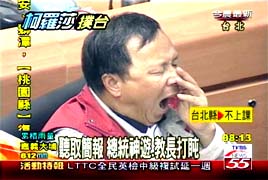
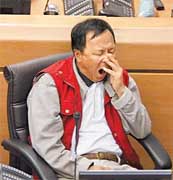
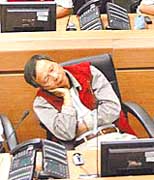
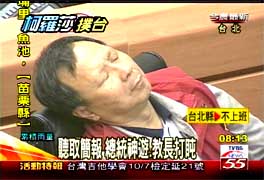
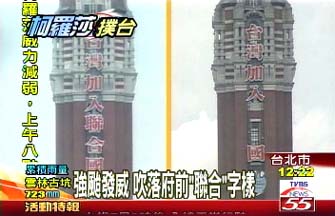
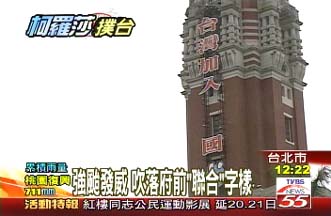
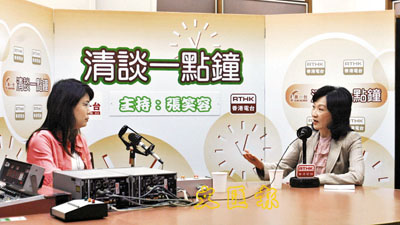
(SCMP)
The verbal war between the camps in December's Legislative Council by-election has heated up, with pro-establishment Regina Ip Lau Suk-yee disapproving of the pan-democrats' street campaigns, calling them cosmetic and recalling opponent Anson Chan Fang On-sang's suppression of her in the government.Speaking on RTHK's An Hour More, Mrs Ip talked openly about the widely reported story that Mrs Chan, then chief secretary, had barred her from being promoted to directorate grade eight. Mrs Ip had been acting in that grade while holding the position as security chief.
She said Mrs Chan had two reasons for the decision, which "mystified" her. "Firstly, she said I was too aggressive. I found this peculiar. Every administrator has ambition or aggression. Even she wanted to become the chief executive. Secondly, she said I gossipped about [the preceding secretary for security, Peter] Lai Hing-ling behind his back."
Yesterday, Regina Ip refused to declare her support to vindicate June 4th. In addition, she opposed the democrats' Legco motion to vindicate June 4th because she believed that this would only intensify the conflict between Beijing and Hong Kong.
Hong Kong Alliance in Support of Patriotic Democratic Movements of China chairman Szeto Wah criticized that her views about the June 4th massacre were just like those of former DAB Ma Lik in that they both tried their best to deny the history of the June 4th massacre and support the suppression of the student movement by the Beijing authorities.
Yesterday, Regina Ip was asked repeatedly about her position about the June 4th motion if she were elected to the Legco. She only said that she had seen the television coverage back then and she felt the same wasy as any Hong Kong person. But she believes that mourning over June 4th is a personal matter which should not be politicized. Therefore, she opposed the Legco motion. "Some people want to politicize this issue in order to create a conflict between the central and SAR governments." She said that one can mourn over June 4th personally, but there should not be a motion about June 4th at the Legco.
When asked about whether she would support the the motion to vindicate June 4th, she replied first that she felt deeply about June 4th just like any other Hong Kong person. "At the time, I was pregnant and I watched television every night. The doctor warned me not to get too excited because that might dead to a premature delivery."
Regina Ip added that the June 4th incident should not be a source of conflict between the central government and Hong Kong. She pointed out that some people often use the June 4th incident as a political issue and create conflicts, especially within the Legco. That is not a good thing for Hong Kong. "When this is debated at the Legco, it becomes a political topic. It is no longer as simple as personal mourning and grieving. There are deeper implications which should be carefully considered."
Hong Kong Alliance in Support of Patriotic Democratic Movements of China vice-chairman Lee Cheuk-yan said that Regina Ip was only trying to minimize June 4th. He said: "Why shouldn't June 4th be raised as a political issue? The June 4th incident began as a political issue. She is saying that in order to sweep the historical fact of the massacre underneath the rug." Lee also said that Regina Ip is trying to show her loyalty to Beijing on one hand while trying to offend Hong Kong people who believe in the vindication on the other hand. The net result is that she failed to please either side.
(Sing Tao)
Regina Ip said that she felt the same way about the June 4th incident as the Hong Kong people. In 1989, she was pregnant and her doctor advised her not to get too excited and affect the baby. She also believes the people of Hong Kong are admirable for persisting in mourning over the June 4th incident over the years.
But she felt that the June 4th issue should not become the core issue or contradiction between the central government and the people of Hong Kong. She pointed out the "vindication of June 4th" is a political issue at the Legco and not a matter of "personal memory and grief." "Besides personal feelings, a Legislative Councilor must also see what is in the best interests of the people of Hong Kong in terms of politics and policies." She believes that the politicization of the June 4th incident (especially at Legco) is not a good thing. As to whether she would support the motion to vindicate June 4th, she will decide if she gets elected.
Regina Ip was also asked by the case of Wang Dan. She said that Hong Kong is a unique and attractive place and it was understandable that Wang Dan wants to come here. She personally has no problem with Wang Dan coming here. But it will be up to the Security Bureau to approve his application based upon his stated purpose. As to whether she will provide any assisatnce to Wang Dan, she said that it was inappropriate to comment since she has not been elected yet.
Other newspapers: The Standard, Ta Kung Pao and Wen Wei Po covered the radio interview, but reported nothing about the June 4th comment. Oriental Daily and The Sun had nothing on Regina Ip's appearance at RTHK at all.
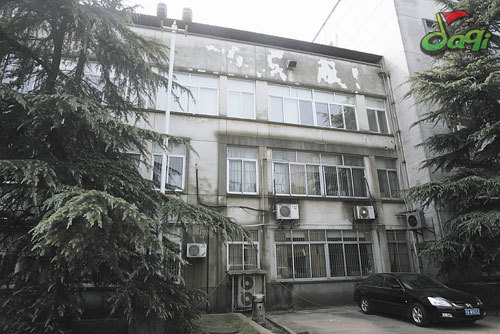
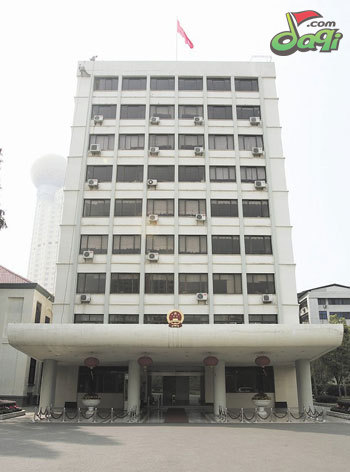
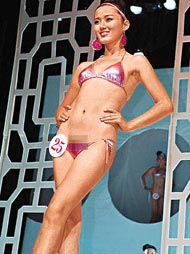
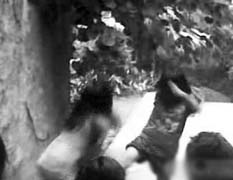
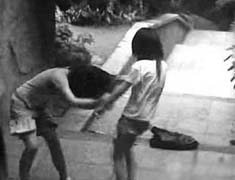
A 7-minute-19-second video clip is being circulated on the Chinese Internet after its first appearance in a local Xiamen website. According to informed sources, "The characters in the video are second-year students from the Xiamen Number Five Middle School and the Xiamen Y Middle School, as well as some recent school drop-outs. These people go about creating trouble and they filmed how they beat up people. Those video clips are posted to podcasts and QQ video for fun and glory."
The video (see link) shows an isolated spot by a wall surrounded by trees. Four students took turns assaulted a girl wearing a green top. At first, two girls were quarreling. After one said, "How can you do this to me if we are friends?" a girl in blue slapped the girl in green and there was a tussle. During the process, the girl in blue kicked the girl in green viciously and tore at her clothes. The victim kept repeating, "Don't do this!" Then a girl in white pushed the girl in green against the wall and kicked her. While the victim was crying, the specators were laughing, yelling and commenting in Minnan dialect.
Related Link: Paparazzi and Celebrity Blogs Most Popular Josie Liu, China in Transition
陳啟禮), a prominent figure of the United Bamboo gang in Taiwan, had passed away at 9:15pm on October 4 in Hong Kong. Chen was born in 1943 in China and moved with his family to Taiwan in 1949. At age 17, he formed the United Bamboo gang with friends. There were five factions within the United Bamboo gang, and Chen Chi-li was with the "ducks." Hence, his nickname was "Lord Duck 鴨霸子."With the start of a new school term, our battle with Company A begins once more. My company is in the business of distributing supplementary textbook guides for elementary and secondary schools and we represent several Beijing-based publishing houses. The quality of our products is high -- these come from top national publishing houses with good reputations.
Our biggest competitor is Company A, the local powerhouse that belongs to the relevant government department which supervises school textbooks and guides. Company A has a near monopoly of the market for supplementary textbook guides.
In the past, the market for school textbooks and supplementary guides was dominated by the local Xinhua bookstore. In recent years, the central government introduced reforms to break up the monopoly. Thus, the provincial government formed Company A. Today, Company A has the monopoly in supplementary guides while Xinhua has the monopoly in textbooks. While it seemed that the former monopoly was broken up, the reality was that the two companies do not have overlapping businesses and they face no competition. The students have therefore not benefited.
Company A monopolizes the market through the following methods.
The supervisory government department publishes a list of "recommended books" in order to "purify the books used for teaching in elementary and secondary schools and to guarantee that they use excellent, authentic publications. This way, the students do not become harmed by poor-quality contraband books and audiotapes." This goes against articles 30 and 35 of the anti-monopoly laws. It goes without say that the book list contains only products for which Company A has exclusive rights to distribute. We could not have access to those books from their publishers no matter what our price offer is. The supervisory government department requires all education departments and schools to order from this book list. This eliminates any chance for companies like ours to compete.
In order to prevent "surreptitious behavior," Company A uses profit incentives to ensure that the education departments and schools will cooperate. Suppose a book costs 10 yuan; they will offer it to the education department at 8.5 yuan; the school will get the book from the education department at 9 yuan; the students will pay 10 yuan. In our industry, it is common knowledge that the cost of the book to the distributor is 2.5 yuan (or 3 yuan for a top quality book). We are able to offer the book to the schools at 5 yuan. Even if the school tags on some additional fees, the students should be paying only 6 yuan. When there is no competition in the market, the consumers suffer the most.
This is a huge market. Every subject requires a supplementary guide, and a student takes seven or eight classes. The average cost per book is between 5 to 6 yuan. The total number of elementary and secondary school students in China is 220 million. You can do the calculation yourself.
The high prices under monopoly have displeased some schools such that they order from companies like us. But Company A has "spies" at the schools -- they are usually students and teachers. Company A will find out immediately when it happens. Then the relevant supervisory government department sends out an investigation team. They withhold the products to investigate whether these are contrabands; they suspend the school leaders pending investigating of receiving bribes. After the hassles, the schools won't dare to order from the outside again.
Even with this blatant monopoly, some local educational departments may decide to order from other companies anyway. Company A therefore recruits and pays the leaders from the local educational departments to consult on their teaching guides, which are then sold locally. The leaders are paid on commissions, so that they receive more money if more copies are sold. This obviously incentivizes the local educational department leaders to protect Company A's market.
Many competitors have dropped out of the business in our province, but we continue to hope that the monopoly may be broken one day.
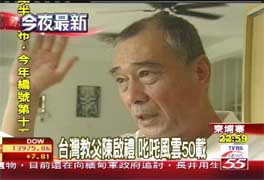
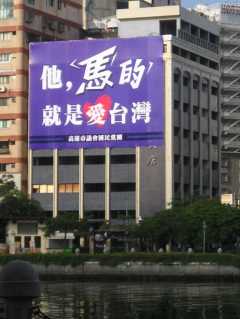
I asked a doctor friend living on Hong Kong Island about her voting intention. This is a middle-class doctor who has lived through Article 23, SARS and July 1st. Her response should provide some food for thought among the pan-democrats:
Mrs. Chan or Mrs. Ip? Of course, I support Ms. Ip. From start to end, Mrs. Ip was consistent and loyal to her own path (most importantly, loyal to her own self). Mrs. Chan is different, because she kept sitting on the fence and her positions and directions are constantly changing. How can someone like that represent us at the Legislative Council?
The Article 23 affair actually shows that Mrs. Ip is a firm talent who is willing to plough ahead in order to accomplish the mission. Honestly speaking, how many of the 500,000 marching on the street back then were really opposing Article 23? Instead, those were angry voices unhappy about the economic and administrative woes. Mrs. Ip was only following the script, which was ordered by Tung Chee-wah, who ultimately quit.
The past is over. We are not voting for a Legislative Councilor. Mrs. Chan was proscrastinating and waited until the last minute before announcing her candidacy. How sincere is she about serving the voters? Her sincerity lags far behind Mrs. Ip.
In the end, I really cannot think of any reason why I should support Mrs. Chan. The outspoken and brave Mrs. Ip gives me greater confidence. My vote will definitely go to Regina Ip.
If the pan-democrats are still uanware that there is pending doom and thus continue to behave like loose sand (Emily Lau is still saying bitterly that "Mrs. Chan does not represent the pan-democrats) and if Mrs. Chan does not work hard to fight, I think that we might as well as hand over the Legco seat to the Great Dictator who has re-packaged herself successfully.
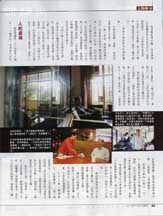
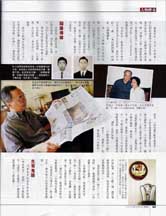
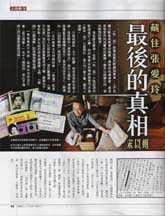
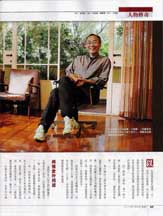
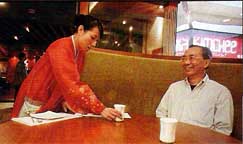
I don't know about starting a brand new website at this time. But I can tell you one story about one lousy customer.
It was just after 11am, and a female customer walked into the restaurant with her two children. She is a regular customer who often comes with her husband, who was parking the car today. The woman said: "I want my usual seat."
The receptionist explained: "This is just after 11am, and we do not have a full staff yet. Your usual seat is back in the farthest corner of the restaurant, and we will not be able to serve you properly."
The customer said, "I don't get it. I am a good customer and you won't give me my usual seat. Well, if that's how it is, then I want this other table here." At that particular table, the waiters and waitresses were quickly eating their lunch at the time so that they can start work soon.
The receptionist explained: "Our workers are eating right now. We cannot just tell them not to eat anymore and make way for your party. I am sure that you appreciate the difficulty. We will be happy with any of your other choice of table in the front of the restaurant."
The customer huffed and puffed a bit, and sat down near the front entrance. Several minutes later, her husband showed up and asked her: "Why are you sitting here? Why can't we get our usual table?" The same explanation was offered, and there were some more rounds of abuse heaped upon the receptionist. Then the husband decided that he was wasting his time in talking to a receptionist. He said, "There is no point in talking to you. I need to speak to the highest level of management in this restaurant."
So the restaurant manager was summoned, and another round of the same explanation was made. Here are some choice words from the husband to the manager: "You don't look like a restaurant manager ... you have a haircut in the style of street punks (="teddy boys") ... I cannot believe this restaurant chain would hire a street punk as the manager ... if they hire people like you as manager, they will be bankrupt before too long ... "
And then there was the final threat: "I had signed up for a frequent diner club before, but I want to cancel the card immediately." The manager explained that he was willing to oblige. However, club membership was premised upon paying HK$300 in cash in exchange for HK$300 in coupons. If a customer wishes to cancel club membership, he needs to return the coupons before he receives the HK$300 in cash back. This particular customer had already used his coupons. When he heard the explanation, the customer said: "Give me the telephone number of your company headquarters right now because I intend to file a complaint against you and your restaurant ... do you know that I am a solicitor? ... you should be expecting to receive a legal letter from my office shortly ..."
Before the customer even made that telephone call, the manager had already called the company headquarters about the incident. This incident occurred several days ago, but the solicitor's letter has not arrived yet.The catchphrase has always been "The Customer Is Always Right." However, there are several hundred thousand restaurant workers in Hong Kong and they are people who should have respect and dignity too. Is there a marketplace for such a website? I doubt it. My doubt is not based upon lack of interest, but because these people work 12 hours or more per day, six days a week. On workdays, they don't have time to read or post at websites; on their one day off per week, they have better things to do than pound on the keyboard to complain about lousy customers. However, they seem to have plenty of time to complain to me while they serve food to me, so maybe I can start a regular series here (if not a dedicated website).
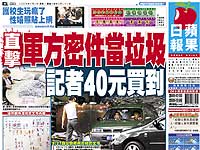
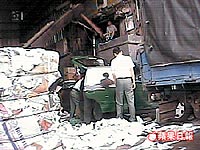
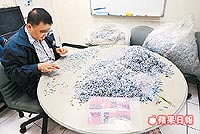
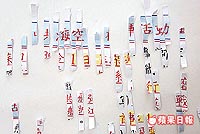
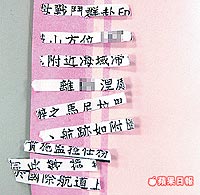
[in translation]
Imperceptibly, the time has come for people to register to run in the District Council elections. Although the various political parties are being overshadowed by the Legco by-election between the two ladies, they are holding political rallies. Among the candidates are many young rookies in the camps of the democrats and leftists. Their enthusiasm is driven by their desire to accumulate experience in local elections in preparation for eventual entry to the Legislative Council. But they do not know that we are no longer living the 1980's and 1990's and joining the District Council has now in fact become the sure way of guaranteeing that they will never reach the Legislative Council.
The District Councils are a product of the British colonial administration era. Back then, the District Councils were regarded as places to nurture political talents. But that was three decades or so ago, when people like Lee Wah-ming, Liu Shing-li, Ng Ming-yum and others rose to the Legislative Council through the District Councils.
What are the District Councils today like? What are the District Councilors like? After the return of Hong Kong to China, the powers of the District Councils did not expand; instead, their powers were imperceptibly reduced by the government. First, there was the appointment system, which reduced the representative nature of the District Councils. Then the government treated the District Councils as places for consulting public opinion without any local administrative powers. The District Councilors can express their own views on certain local minutiae which affects the three thousand or so people in their community, but they are powerless with respect to any higher-level policies. For example, District Councilor A told me that he had been complaining about the bicycle path in his district for years without any government officials paying any attention. How do political talents get nurtured as a result?
Today's District Councilors are just voluntary workers in their districts. On behalf of the three thousand or so people in their districts, they worry about whether the street lights are working, they organize day tours and they buy discount moon cakes and Lunar New Year merchandise. How do such District Councilors expect to become Legislative Councilors?
Let us study the history. Since Cheng Kar-fu and Wong Shing-chi nine years ago, no Democratic Party district councilor has joined the Legislative Council. What about the DAB? If the democrats had not made way with their diamond list in New Territories East, Lee Kwok-ying would not have been able to sneak in. In the 2004 Legislative Council direct elections, Long Hair never ran in District Council elections and the Civic Party barristers had no prior local political experience. James Tien was a Hong Kong Island district councilor, but he ran for a Legco seat in New Territories East this time. Meanwhile former District Councilors such as Woo Chi-keung all failed. Being a District Councilor is no longer a stepping stone to advance in politics; if anything, a District Councilor is more likely to stay there forever.
Today, the people of Hong Kong are politically aware. They want people with certain abilities and skills (such as barristers and former government officials) to become Legislative Councilors. The District Councilors serve their neighbors, who may not support them for the Legislative Council. The District Councils and the Legislative Council are completely different things! The best Democratic Party District Councilor Fan Kwok-wai can win overwhelmingly within his own district, but can he get into the Legislative Council? Today, the people of Hong Kong have two sets of standards for Legislative Council and District Council elections. Just because they support someone for the District Council does not mean that they support the same person for the Legislative Council!
Lee Sai-man said that if you want to be a Legislative Councilor, you should not become a District Councilor. To a certain degree, I agree with him because the citizens are keenly aware of the differences: you can be my District Councilor, but it does not mean that I will elect you to become my Legislative Councilor! You want to enter the Legislative Council through the District Council? This is not going to happen unless they double the number of seats in the Legislative Council. The example of Kam Nai-wai show the political neophytes just what the chances are.
Unless the system of councils is radically reformed, the District Councilors will forever remain local volunteer workers. The government pays them under HKD 20,000 a month to take care of all big and small businesses within the district. This is cheaper than the government hiring an Administrative Officer. It is objectively and subjectively impossible for the political parties to nurture political talents through being District Councilors. Are the political rookies who are entering the District Council elections aware of the problems here?


Part 1 (10% of total score): Legislative Council pan-democrats. 15 votes (88.2% share) for Anson Chan and 2 votes (11.8%) for Lo Wing-lok.
Part 2 (10% of total score): District Council pan-democrats. 13 votes (86.7% share) for Anson Chan and 2 votes (13.3%) for Lo Wing-lok.
Part 3 (30% of total score): Pan-democratic organization members. 141 votes (64.1% share) for Anson Chan and 79 votes (35.9%) for Lo Wing-lok.
Part 4 (50% of total score): Hong Kong University Public Opinion Programme poll of 1,011 Hong Kong Island residents. 475 (or 47%) chose Anson Chan, 110 (or 10.9%) chose Lo Wing-lok, 303 (or 29.9%) chose "none of the above" and 123 (or 12.2%) said "Don't know/hard to say/blank vote." Between the two, 475 (or 81.2%) voted for Anson Chan and 110 (or 18.8%) voted for Lo Wing-lok.
The final score was 8.8 + 8.7 + 19.2 + 40.6 = 77.3 points for Anson Chan and 1.2 + 1.3 + 10.8 + 9.4 = 22.7 points for Lo Wing-lok.
Archives